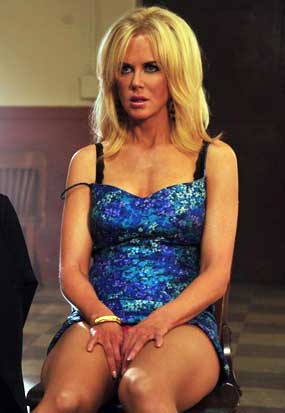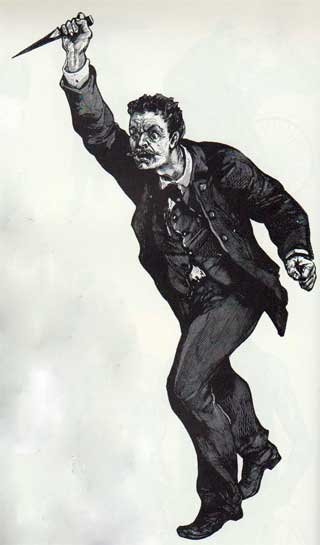Film (2012)
Directed by Lee Daniels
Screenplay by Lee Daniels and Peter Dexter
Based on a novel by Peter Dexter.
With Zac Efron (Jack Jansen), Matthew McConaughey (Ward Jansen), Nicole Kidman (Charlotte Bless), John Cusack (Hillary Van Wetter), David Oyelowo (Yardley Acheman), Scott Glenn (W.W. Jansen), Macy Gray (Anita Chester)

Photo: Courtesy Millennium Films
A judge is murdered in the South and Hillary Van Wetter (John Cusack) has been convicted of the murder and put on death row. For some obscure reason, sultry, middle-aged, Charlotte Bless (Nicole Kidman) develops a passion from afar for Van Wetter and enlists journalists Ward Jansen (Matthew McConaughey) and Yardley Acheman (David Oyelowo) to investigate the murder and to find what she feels must be the real killer in the hope of getting Van Wetter freed. Jack Jansen (Zac Efron), Ward Jansen’s younger brother, trails along, but his suddenly kindled passion for the elder Bless rides right out front. They all wind up going to visit Hillary Van Wetter in prison. A complex knotting of relationships and events follows, spilling a fair amount of blood and errant passion along the way.
This star-studded foray into post Pulp Fiction Southern wildness is, for the bulk of it, obsessed with wild passions. Nicole Kidman plays Charlotte Bless, the femme fatale, a steamy fortyish vamp with a heart of gold, who sweeps away practically everyone in sight, but, in particular, Jack Jansen (Zac Efron) who is seemingly half her age.
Kidman plays the role broadly, and with irresistable earthiness. A scene in which she, from six feet away during a prison interview, enacts an orgasmic hump-at-a-distance with convicted murderer Hillary Van Wetter is worth the price of admission. It would be hard to find a non-coital orgasm so well depicted since Meg Ryan’s faux display of one in the comic film When Harry Met Sally (1989). But, The Paperboy is no comedy, and, from the looks of it, Charlotte Bless’ orgasm does not seem the least bit faux.
There is much violence, strangeness and an odd, ambiguous tone throughout. Following the lead of the film Pulp Fiction (1994), this film laughs from the side while throats are slit and faces are beaten to mush. Is this a suspense drama, a comedy, or some hybrid? Having it set in the South seems to bring along a crackerjack sensibility that allows lunacy to travel intimately with violence and strangely create an hysterical chuckle along the way. This is the perfect corollary to the Pulp Fiction premise that, through the right filter, unremitting violence can be made funny.
The most penetrating element in this film, however, is something more subtle. Despite all the overt sex and the spilling of blood, the lasting story is the racial one.
Along the way, much is shown about the touching and vivid relationship between Jack Jansen and his family’s African-American maid, Anita Chester (Macy Gray). The film is narrated by Chester, as an implicit account about Jack early developments along the way to being a writer. But really the story is about the two of them and their kinds, and the embattled frailties of feeling between whites and blacks who lived closely with one another within a wider context of prejudice and brutality.

Photo: Courtesy Millennium Films
All of the actors are quite good.
Kidman’s Bless is a middle-aged sex kitten in the Marilyn Monroe style, but more sordid, and sweetly effective in a lurid way.
Matthew McConaughey continues his adventure into non-pretty-boy roles and gets significantly banged up here, calling a bit to mind the Harvey Dent (Aaron Eckhardt) facial alterations in the Batman film, The Dark Knight (2008).
Scott Glenn (W.W. Jansen) is wizened, grizzled and solid as the boys’ patriarch.
John Cusack plays the crazy criminal with convincing loose-screwiness. His characters are usually nutty, but loveable. Here, despite Charlotte Bless’ fascination with Hillary Van Wetter, there is very little loveability coming from this performance. But he is good and it is interesting to see him do this kind of role.
Zac Efron, as Jack, always seems a bit like he is squinting under the glare of the spotlight, but he does ok, all in all.
This strange script by Lee Daniels, the director, and Peter Dexter, the writer of the novel on which the script is based, gives the feeling, in the end, of not really going anywhere.
But, Lee Daniels, who had directed the film Precious (2009), the celebrated story of an overweight, illiterate, pregnant African-American Harlem teenage girl, has cracked open, in passing and despite the general haziness of The Paperboy narrative, a thoughtful window into Southern race relations that gives the film its best value.
– BADMan

Leave a Reply